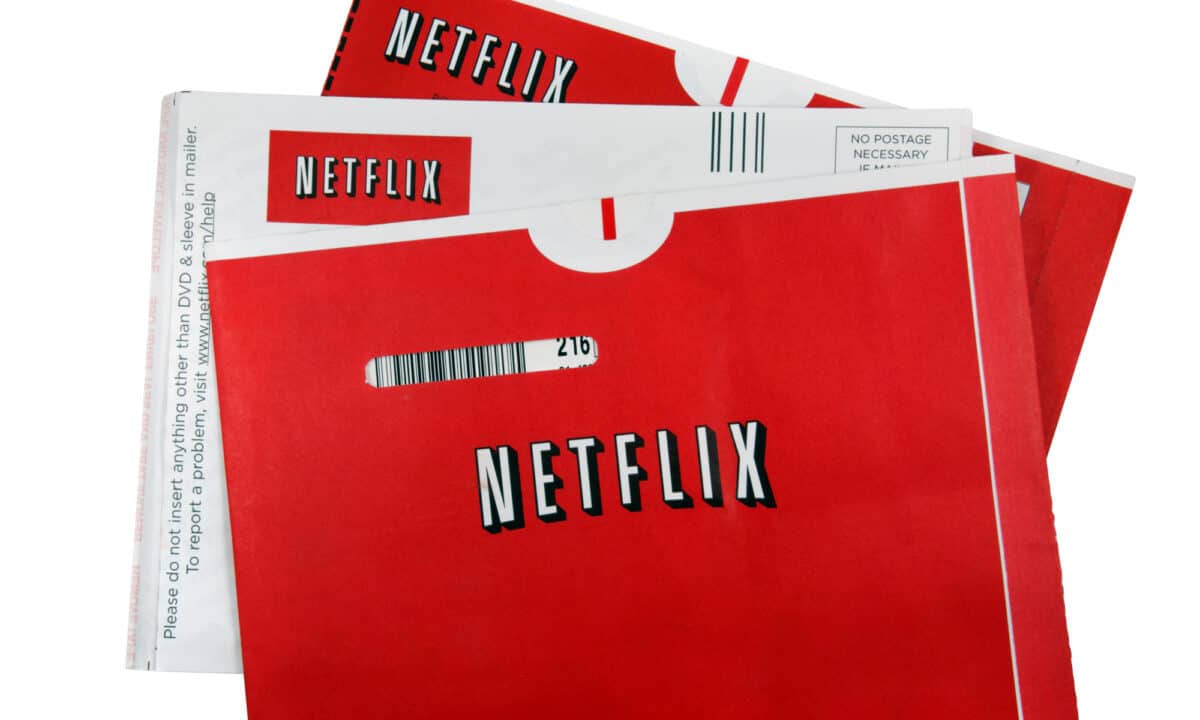Key Points:
- Netflix began as a subscription-based service to offer DVD rentals by mail, and obtained 239,000 subscribers and a library of 3,100 DVDs by the end of the 1999.
- Some of Netflix’s acquisitions include: Grauman’s Egyptian Theatre, StoryBots, Millarworld, Next Games, and Albuquerque Studios.
- Netflix has undergone a number of controversies since it was founded, many of them focused on the content of their chosen and produced content, though some of the company’s activities have also been criticized.
The Founding of Netflix: How It Happened
In 1997, Reed Hastings and Marc Randolph founded Netflix, Inc. The video-rental company has undergone a significant amount of changes since those early days and now accounts for approximately 15% of the entire world’s bandwidth.
The company’s co-founders both share various stories about how Netflix was founded. Reed Hastings tells a story about paying $40 in late fees for a single rental movie as his moment of inspiration. For Marc Randolph, the two serial entrepreneurs were simply looking for a business idea to compete with amazon.com.
Quick Facts
- Year Founded
- 1997
- Founders
- Reed Hastings and Marc Randolph
- Industry
- production company and subscription steaming service
- Headquarter
- Los Gatos, California
- Key People
- Reed Hastings and Marc Randolph
- Notable Products
- Netflix Originals
- Website
- https://www.netflix.com/
That goal led the company along a successful timeline to its current size. The company has seen massive growth, and a number of controversies, since its founding. Reed Hastings currently has a net worth of around $5.8 billion, while Marc Randolph has a net worth of approximately $100 million.
The History of Netflix: What to Know
In Scotts Valley, California, Reed Hastings and Marc Randolph decided to found an online company. They reviewed ideas from surfboards and custom baseball bats to home-delivery shampoo and personalized dog food before eventually coming up with DVD rentals.
DVDs, which had only been invented at the end of 1995, were just becoming available in the United States. The entrepreneurs quickly realized that videos could now be sent through the mail, rather than relying on customers coming to video rental stores. To test their business idea, Randolph mailed a CD to Hastings’ house to see if a disc would survive being mailed. Once it did, the business partners knew Netflix was a viable business idea. Review the timeline of the company’s success story below.
Netflix Through the Decades
1990s: DVDs By Mail

©iStock.com/ABDESIGN
The timeline of Netflix starts in 1997. At first, the company provided a subscription-based service to offer DVD rentals by mail. The website was launched on April 14, 1998, with 137 orders coming on the first day. The decade ended with 239,000 subscribers, a library of 3,100 DVDs, and a failed deal between Netflix and Sony that led to a short period of slow growth.
2000s: Going Public
The 2000s started with Hastings approaching Blockbuster to offer the company for sale. John Antioco, the former CEO of Blockbuster, laughed during the meeting to discuss purchasing Netflix for $50 million. In just two years, the IPO raised over $82 million.
2010s: Streaming Content
While the first streaming content was introduced in 2007, the company refocused itself. As Reed told investors, “We are now a streaming company which also offers DVDs by mail.” Netflix continued to grow throughout the decade and introduced its first original shows. The DVD rental portion of the company was split into a second company, Qwikster, which didn’t last long and was canceled just weeks after the split.
2020s: The Future of Streaming Services
The COVID-19 pandemic saw a major increase in Netflix users and streaming services in general. As the decade progresses, however, some users feel the ceiling of streaming services may have been hit. Studies reveal that millennials and Gen Z respondents are more interested in TikTok and YouTube content, rather than a paid streaming platform. The company is researching ad-supported tiers and other streaming formats to increase revenue and the number of users.

©Harry Wedzinga/Shutterstock.com
What Are the Best TV Shows on Netflix?
Netflix continues to update its content and offer the latest TV show episodes. With weekly updates and a large list of highly-rated television shows, it can be difficult to know what to watch or what is the most popular shows on Netflix. You can find a list of some of the best shows to stream on our The 10 Best Shows to Stream on Netflix Right Now page.
What Are the Best Movies on Netflix?
In addition to the best shows and Netflix original shows, the streaming service also offers a number of full-length movies. Here are the top 10 best movies, according to the total hours viewed in the first 28 days after the title was released:
- Red Notice
- Don’t Look Up
- Bird Box
- The Adam Project
- Extraction
- The Unforgivable
- The Irishman
- The Kissing Booth 2
- 6 Underground
- Spenser Confidential
How Does Netflix Make Money?
As a subscription-based streaming platform, Netflix’s primary revenue source is its monthly subscription payments. The company is also exploring potential ad-based revenue options.
Netflix’s core metric is to determine the household views of a show. A household view is two minutes or more of watch time. The following top 10 best shows and best movies, from You to Bridgerton, are organized by this metric, rather than total hours watched:
- You (Season 2): 457 million hours
- You (Season 3): 468 million hours
- Maid: 469 million hours
- 13 Reasons Why (Season 1): 476 million hours
- 13 Reasons Why (Season 2) 496 million hours
- The Witcher (Seasons 1) 76 million hours
- Stranger Things (Season 3): 67 million hours
- Money Heist (Part 4): 65 million hours
- Bridgerton (Season 1): 82 million hours
- Squid Game (Season 1): 142 million hours
Netflix Acquisitions
Grauman’s Egyptian Theatre

©Alex Millauer/Shutterstock.com
Netflix acquired the iconic Hollywood location in May 2020. Since 1922, this theater has been an integral part of Las Angeles history and has been the premier location for many important films and TV seasons.
Albuquerque Studios
In 2018, the company purchased Albuquerque Studios for around $30 million. The studio features production offices, nine sound stages, and a backlot. It offers Netflix a dedicated studio space, unlike the many studios it leases around the world.
Scanline VFX
Scanline VFX has been operating since 1989, and was acquired by Netflix in 2021. The dynamic VFX studio partnered with Netflix on a number of projects before being acquired.
Night School Studio LLC
Netflix has been moving into the gaming industry with a few key acquisitions. Night School Studio was the first gaming studio purchased. The acquisition helped create Netflix games.
The Roald Dahl Story Company
In 2021, The Roald Dahl Story Company was purchased to expand the live-action and animated offerings on the platform. Netflix also acquired the publishing rights to all the company’s back catalog to explore immersive experiences, games, live performance streaming, and more.
StoryBots
JibJab Bros. Studios sold StoryBots to Netflix in May 2019. This acquisition was designed to help expand the kids’ show offerings on the platform.
Millarworld
The famous Scottish comic book writer, Mark Millar, created and then sold Millarworld to Netflix. The company comes with publishing rights for a broad range of movies and television shows for comic book fans.
Next Games
A Finnish company, Next Games was acquired for 65 million euros to help create Stranger Things: Puzzle Tales and other projects. Next Games worked with Netflix on a few projects before the acquisition.
Boss Fight Entertainment
The most recent video game acquisition by Netflix is Boss Fight Entertainment, based in Allen, Texas. The purchase was another step toward a growing video game portion of the streaming service provider.
Netflix’s Notable Controversies
Netflix has undergone a number of controversies since it was founded. Many of these focus on the content of their chosen and produced content, though some of the company’s activities have also been criticized.
Controversial TV Show and Film Content
From harmful depictions to offensive misrepresentations, here are some of the major controversies regarding content on Netflix:
- Child sexualization in Cuties: The 2020 original French film tells the story of a group of 12-year-old girls, joined by Amy, a Muslim Senegalese immigrant, who form a dance troupe. While the film was meant to be about empowerment and coming of age, critics felt the film promoted child sexualization, particularly due to the provocative Netflix featured image. The company first made it difficult to search for before finally removing the film.
- Cultural appropriation in Step Sisters: The original film about a Black sorority teaching a white sorority to step dance was criticized since the trailer came out due to cultural appropriation and harmful stereotypes. Mixed reviews and a minor boycott soon followed.
- Harmful jokes about the transgender community in The Closer: Dave Chappelle’s comedy special includes controversial and harmful comments against the transgender community. When the scandal was brought up to the company, the issue wasn’t dealt with seriously.
- Stereotyping in Atypical: The comedy that highlights the life of a teenager on the autism spectrum is seen by many viewers and critics as a stereotyped, unhumorous account.
- Smoking in House of Cards and Orange Is the New Black: Both of these Netflix originals depict far higher use of smoking than broadcast television, which critics reported encouraged smoking use among users.
- Harmful depictions of suicide in 13 Reasons Why: The hit Netflix original series was first released in 2017. Many felt the show depicted harmful, even sensationalized representations of depression, suicide, and post-traumatic stress disorder. Netflix decided to remove a particularly graphic scene in 2019.
- Chinese propaganda in The Three-Body Problem: When the company partnered with Liu Cixin to release his show, five U.S. senators felt the company was promoting Chinese propaganda. Netflix responded that the show didn’t represent the company’s views.
- Pseudoscience scandal: Many critics pointed out the pseudoscience promoted by Gwyneth Paltrow’s documentary series, The Goop Lab. The series promoted claims that were seen as unsubstantiated, which led to civil penalties and fines in 2018. The Goop Lab hasn’t been the only show criticized for unsubstantiated health claims.
- International depictions: Netflix has been criticized in various countries due to streaming controversial content. Some of these issues include female characters without hijabs in Jordan, LGBT characters in Turkey, and depictions of death camp locations in Poland in violation of the Act on the Institute of National Remembrance.
Controversial Corporate Activities
The company has also made controversial decisions and actions throughout its history. Here are some key moments in its corporate activities that have been criticized or led to a lawsuit:
- Throttling DVD allocation policy scandal: One of the earliest controversies in the company’s history was throttling DVD allocation. A class-action lawsuit in 2004 alleged that Netflix used false advertising to claim consumers could receive one-day delivery on an unlimited amount of rentals. Consumers who frequently used the service were demoted in priority and saw delays in shipment.
- Censored version of Back to the Future Part II: Netflix has been criticized for supporting censored versions of films, most notably Back to the Future Part II. The company issued a statement saying the censorship was unintentional and the full version was included.
- Copyrighted subtitle use in Bicycle Thieves: The 1948 Italian film was released on Netflix in 2015. Corinth Films sued the company due to the use of copyrighted subtitles, despite the fact that the film itself is considered public domain.
- Tax avoidance: The Institute on Taxation and Economic Policy stated in 2018 that Netflix didn’t pay any state or federal taxes, despite having its most profitable year. There have also been allegations of the company avoiding taxes in South Korea, Italy, and the United Kingdom.
Controversial Consumer and Technical Issues
- Virtual Private Network (VPN) blocking: Many Netflix users use a VPN to hide their actual location in order to bypass geo-blocking features. Netflix has been criticized for not taking the necessary steps to restrict access to copyrighted titles in particular countries. The company began restricting VPN access in 2016.
- Customer data release: The 2006 Netflix Prize competition opened up some of the rental customer data to the contestants. The goal of the competition was to help improve the user preference prediction model. The contest ended with a lawsuit due to sharing personal data that wasn’t properly anonymized.
- Closed captioning issues: A 2011 lawsuit by the Disability Rights Education and Defense Fund alleged that Netflix lacked suitable subtitles as defined under the Americans with Disabilities Act. The settlement required the company to provide closed captioning for its entire library of TV shows and movies by 2014.
Up Next…
- The History of Warcraft Find out all there is to know about the legendary game that revolutionized the gaming industry.
- The Real Reason MySpace Failed Spectacularly It had the makings of a social media site that would endure. Yet, Myspace collapsed. Find out why in this fascinating read.
- How to Permanently Delete Your Twitter Account in 4 Steps (with Photos) An increasing number of Twitter users are exiting the platform. Here’s how to make a clean break.
The image featured at the top of this post is ©Proxima Studio/Shutterstock.com.







